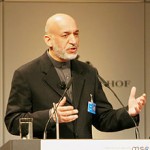
Without strong policing, locals fear return to 1990s civil war.
from Radio Free Europe/Radio Liberty
KABUL — Afghan officials and lawmakers are warning Washington not to consider a "zero option" of withdrawing all U.S. troops from the country after 2014.
"It is a factual possibility, it is possible that all [US] forces would withdraw from Afghanistan," Abdullah Abdullah, the leader of the opposition group National Coalition of Afghanistan and a former foreign minister and presidential candidate, told Radio Free Afghanistan. "But, if until that time the Afghan government does not fulfill its responsibilities, as it has failed so far, then the withdrawal will have a negative impact on the situation in Afghanistan."
Abdullah's concerns were echoed by other leaders in Kabul.
"If Americans pull out all of their troops without a plan, the civil war of the 1990s would repeat itself," says Naeem Lalai, an outspoken lawmaker from the volatile Kandahar Province, the birthplace of the Taliban. "[A full withdrawal] will pave the way for the Taliban to take over militarily."
One tough question is which country would exercise criminal jurisdiction over US military personnel who remain after 2014. A refusal by Iraq to grant immunity to American soldiers ended the US military presence in that country a year ago.
On January 8, U.S. deputy national security adviser Ben Rhodes called a complete pullout of troops "an option that we would consider." But he made it clear that a decision on post-2014 troop levels is not expected for months and will be made based on two U.S. security objectives in Afghanistan.
He listed those objectives as denying a safe haven to Al-Qaeda and ensuring Afghan forces are trained and equipped so that they ultimately can secure the nation. [In fact, Obama and Karzai agreed to speed up the training in order to expedite the transfer.]
Some Afghan lawmakers view this announcement before the meeting in Washington as a possible opening move for what could be tough talks between Obama and Karzai.
"It is a kind of political game," says Afghan deputy Shukria Barekzai. "Probably they may like to show the worst picture for the entire world, probably they may pass a very happy message to the insurgents — the Taliban and extremist groups in the region — that, 'Guys, we will welcome you to the land, we are leaving', but whatever was the reason of that kind of message, I condemn it because officials should be responsible."
NATO and its partners are racing against the clock to train Afghanistan’s 350,000-strong security forces, but questions remain over how they well they will be able to tackle insurgents in the face of intensifying violence.
The US and Afghan presidents were to speak directly about how many troops should remain in Afghanistan after the NATO-led combat mission ends there in 2014. But the subject is complicated by difficulties both sides are having in ongoing discussions of a status-of-forces agreement that would authorize a future US troop presence.
One tough question is which country would exercise criminal jurisdiction over US military personnel who remain after 2014. A refusal by Iraq to grant immunity to American soldiers ended the U.S. military presence in that country a year ago.
On the streets of Kabul, ordinary citizens like Salahuddin Khan greeted the news that Washington could consider a complete pullout of forces after 2014 with trepidation.
"If all US troops leave Afghanistan after 2014, the civil war will start once again, because we have experienced civil war in the past and it will happen again if all troops go home," Khan says.
But others, like Kabul resident Farhad Jan, believe the Afghan National Army would be ready to take charge of security.
"I think it is necessary for US troops to withdraw from Afghanistan because our national army is capable enough to defend and save the country in any situation," he says.
NATO and its partners are racing against the clock to train Afghanistan's 350,000-strong security forces, but questions remain over how they well they will be able to tackle insurgents in the face of intensifying violence.
The United States has about 68,000 troops in Afghanistan and that number is expected to reduce sharply ahead of December 31, 2014 — the official end date for the NATO-led combat mission.
Washington officials have privately said the White House is seeking a post-2014 presence of between 3,000 and 9,000 troops, which is significantly less than the 6,000 to 15,000 number given by the top US commander in Afghanistan, U.S. General John Allen.
Written by Charles Recknagel, based on reporting by RFE/RL's Radio Free Afghanistan and Reuters.
© Copyright 2013 Radio Free Europe/ Radio Liberty, All rights Reserved. Written For: StraightGoods.ca

Sorry, the comment form is closed at this time.